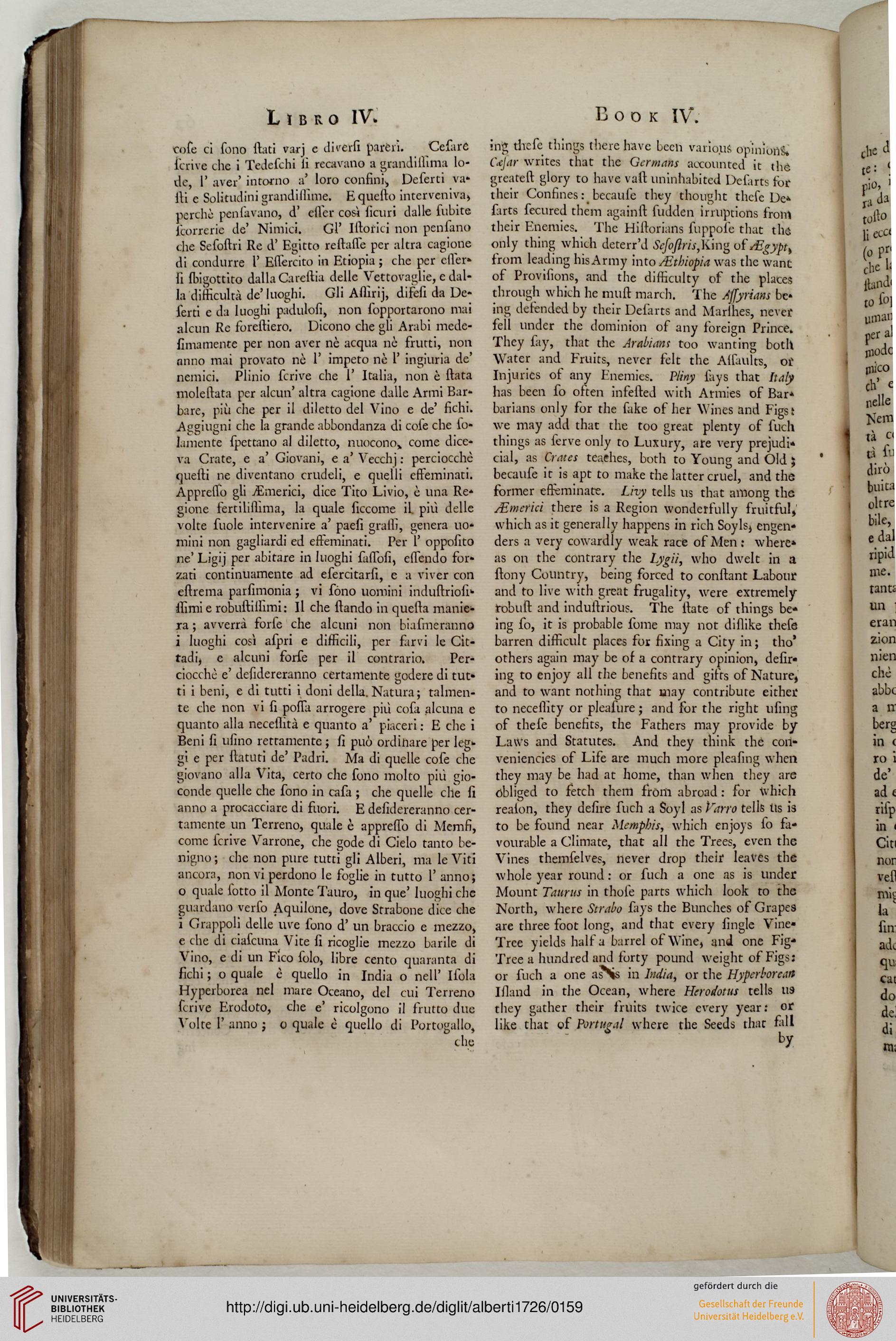Libro IV.
cose ci sono flati varj e divertì partii. Cesare
scrive the i Tedeschi li recavano a grandilìima lo-
lle, 1' aver' intorno a' loro confini, Deserti va-
ili e Solitudini grandissime. E quello interveniva»
perchè penavano, d' cll'cr così iicuri dalle subite
seorrcric de' Nimici. GÌ' Molici non peniano
che Scsostri Re d' Egitto rellasse per altra cagione
di condurre 1' Esserato in Etiopia ; che per clì'er-
li (bigottito dallaCaresbs delle Vettovaglie, e dal-
la difficult* de' luoghi. Gli Assìrij, difesi da De-
serti e da luoghi padulosi, non (rapportarono mai
alcun Re foreiliero. Dicono che gli Arabi mede»
simamentc per non aver nò acqua nò frutti, non
onno mai provato né 1' impeto nò 1' ingiuria de'
nemici. Plinio scrive che 1' Italia, non è stata
molellata per alcun' altra cagione dalle Armi Bar-
bare, più che per il diletto del Vino e de' fichi.
Aggiugni che la grande abbondanza di cose che lo-
lamcnte {penano al diletto, nuocono,, come dice-
va Crate, e a' Giovani, e a' Vecchi : perciocché
quelli ne diventano crudeli, e quelli effeminati.
Appresso gli omerici, dice Tito Livio, è una Re-
gione fertilillima, la quale siccome il più delle
volte suole intervenire a' paesi gialli, genera uo-
mini non gagliardi ed effeminati. Per 1' opposito
ne' Ligij per abitare in luoghi sassosi, essendo for-
zati continuamente ad esercitarsi, e a viver con
estrema parsimonia ; vi sono uomini induslriosi-
tììmi e robustillimi: ]l che ssando in quella manie-
ra ; avverrà forsè che alcuni non biasmeranno
i luoghi così aspri e difficili, per farvi le Cit-
tadi, e alcuni forsè per il contrario. Per-
ciocché e' desidereranno certamente godere di tut-
ti i beni, e di tutti i doni della. Natura; talmen-
te che non vi si possa arrogere più cosa alcuna e
quanto alla necessità e quanto a' piaceri: E che i
Beni si tisino rettamente ; si può ordinare per leg-
gi e per staniti de' Padri. Ma di quelle cose che
giovano alla Vita, certo che sono molto più gio-
conde quelle che sono in casii ; che quelle che si
anno a procacciare di fuori. E desidereranno cer-
tamente un Terreno, quale è appresso di Menili,
come scrive Varrone, che gode di Cielo tanto be-
nigno ; che non pure tutti gli Alberi, ma le Viti
ancora, non vi perdono le foglie in tutto 1' anno;
o quale lotto il Monte Tauro, in que' luoghi che
guardano verso Aquilone, dove Srrabone dice che
i Grappoli delle uve sono d' un braccio e mezzo,
e che di ciaseuna Vite si ricoglie mezzo barile di
Vino, e di un Fico solo, libre cento quaranta di
fichi; o quale è quello in India o nell' Isola
Hypciborea nel mare Oceano, del cui Terreno
scrive Erodoto, che e' ricolgono il frutto due
Volte 1' anno ; o quale è quello di Portogallo,
che
Eook IV.
ing these things there have been various opinions,
Cejar writes that the Germans accounted it the
greatelt glory to have vail uninhabited Dcl'arts for
their Confines: becausc they thought thesc De»
sarts secured them against sudden irruptions from
their Enemies. The Hillorians suppose that the
only thing which deterr'd Scsofl>is,k'mg ut'/Egypty
from leading his Army into /Ethiopia was the want
of Provisions, and the difficulty of the places
through which he mull march. The Assyrians be-
ing defended by their Desine and Marines, never
fell under the dominion of any foreign Prince.
They say, that the Arabians too wanting both
Water and Fruits, never felt the Assaults, os
Injuries of any Enemies. Pliny says that Italy
has been so often infested with Armies of Bar»
barians only for the sake of her Wines and Figs :
we may add that the too great plenty of such
things as serve only to Luxury, are very prejudi»
cial, as Urates tcaehes, both to Young and Old ;
because it is apt to make the latter cruel, and the
former effeminate. Livy tells us that among the
/Enterici there is a Region wonderfully sruitful,
which as it generally happens in rich Soyls, engen-
ders a very cowardly weak race of Men : where»
as on the contrary tile Lygii, who divelt in a
slony Country, being forced to constant Labour
and to live with great Frugality, were extremely
tobult and indubious. The Hate of things be»
ing so, it is probable sonie may not dislike these
barren difficult places for fixing a City in; tho'
others again may be of a contrary opinion, desir»
ing to enjoy all the benefits and gifts of Nature,
and to want nothing that may contribute either
to necellity or plcasure ; and sor the right tiling
of these benefits, the Fathers may provide by
Laws and Statutes. And they think the con-
veniencies of Life are much more pleasing when
they may be had at home, than when they are
obliged to fetch them from abroad : for which
realon, they desire such a Soyl as l'atro tells tis is
to be found near Memphis, which enjoys so fa-
vourable a Climate, that all the Trees, even the
Vines themselves, never drop their leaves the
whole year round : or silth a one as is tinder
Mount Taurus in those parts which look to the
North, where Strabo says the Bunches of Grapes
are three foot long, and that every single Vine-
Tree yields half a barrel of Wine, and one Fig»
Tree a hundred and forty pound weight of Figs:
or such a one asNs in Win, or the Hyperborean
Issand in the Ocean, where Herodotus tells us
they gather their fruits twice every year: or
like that of Portugal where the Seeds that fill
by
te:
pio,
i




